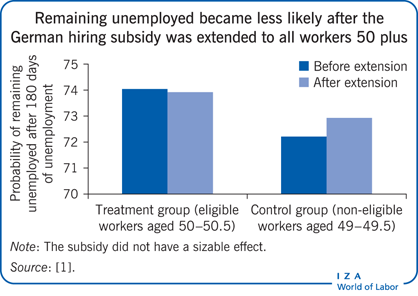Elevator pitch
Population aging in many developed countries has motivated some governments to provide wage subsidies to employers for hiring or retaining older workers. The subsidies are intended to compensate for the gap between the pay and productivity of older workers, which may discourage their hiring. A number of empirical studies have investigated how wage subsidies influence employers’ hiring and employment decisions and whether the subsidies are likely to be efficient. To which groups subsidies should be targeted and how the wage subsidy programs interact with incentives for early retirement are open questions.
Key findings
Pros
With populations aging, countries are looking for policy instruments to boost the employment rates of older workers and re-integrate older unemployed workers into the labor market.
Subsidizing work rather than unemployment may be an effective market-based policy.
Wage subsidies compensate for any pay–productivity gap among older workers and may increase their employability.
Wage subsidies appear to be more effective than creating public sector jobs.
Even if rigorous studies find that the policy is mostly ineffective, there are positive effects for some population groups, such as women.
Cons
The effects of the policy on employment are severely reduced by deadweight, displacement, and substitution effects.
Only large and properly targeted subsidies can be expected to have substantial effects, limiting their cost-effectiveness.
If subsidies are given on a case-by-case basis, the policy may induce discrimination and stigma effects.
Abolishing early retirement incentives and increasing older workers’ employability may be more effective than wage subsidies.
